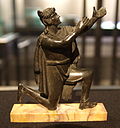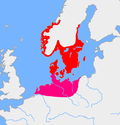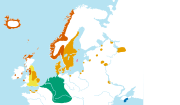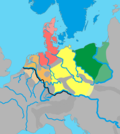Early Germanic culture was the culture of the early Germanic peoples. The Germanic culture started to exist in the Jastorf culture located along the central...
115 KB (14,632 words) - 21:05, 21 November 2024
the Early Middle Ages. The calendars were an element of early Germanic culture. The Germanic peoples had names for the months that varied by region and...
39 KB (3,202 words) - 23:40, 14 November 2024
Leges Barbarorum, 'laws of the barbarians', also called Leges) of the early Germanic peoples. These were compared with statements in Tacitus and Caesar as...
47 KB (5,889 words) - 07:48, 2 November 2024
position is held by rings in early Germanic cultures, appearing both in archaeology throughout areas settled by Germanic peoples, and in textual sources...
21 KB (2,174 words) - 08:16, 1 November 2024
Germanic culture is a term referring to the culture of Germanic peoples, and can be used to refer to a range of time periods and nationalities, but is...
7 KB (958 words) - 17:57, 17 October 2024
Romano-Germanic describes the conflation of Roman culture with that of various Germanic peoples in areas successively ruled by the Roman Empire and Germanic...
5 KB (454 words) - 11:29, 7 September 2024
The Germanic peoples were tribal groups who lived in Northern Europe in Classical Antiquity and the Early Middle Ages. In modern scholarship, they typically...
164 KB (20,237 words) - 21:00, 21 November 2024
Vistula (Oksywie culture, Przeworsk culture), Germanic speakers came into contact with early Slavic cultures, as reflected in early Germanic loans in Proto-Slavic...
130 KB (12,136 words) - 03:56, 16 November 2024
Early Germanic Literature and Culture is a book edited by Brian O. Murdoch and Malcolm Read. The book was published by Camden House in 2004. It covers...
5 KB (332 words) - 06:03, 7 November 2024
BC. Wars were frequent between and within the individual Germanic peoples. The early Germanic languages preserve various words for "war", and they did...
30 KB (3,537 words) - 21:04, 21 November 2024
Continental Germanic mythology. It was a key element of Germanic paganism. As the Germanic languages developed from Proto-Indo-European language, Germanic mythology...
9 KB (973 words) - 19:50, 30 July 2024
Germanic paganism or Germanic religion refers to the traditional, culturally significant religion of the Germanic peoples. With a chronological range...
128 KB (15,974 words) - 22:17, 7 November 2024
from the Battle Axe culture, possibly through its superimposition upon the earlier megalithic cultures of the area. The Germanic tribal societies of Scandinavia...
91 KB (10,684 words) - 19:13, 25 October 2024
mythology, legendry, and folk beliefs of early Germanic culture. By way of the comparative method, Germanic philologists, a variety of historical linguist...
72 KB (1,709 words) - 20:31, 8 July 2024
Przeworsk culture also shows significant contact with the Jastorf Culture, associated with the spread of early Germanic tribes and the early Suevian peoples...
13 KB (1,467 words) - 09:34, 20 October 2024
The Germanic substrate hypothesis attempts to explain the purportedly distinctive nature of the Germanic languages within the context of the Indo-European...
22 KB (2,173 words) - 23:17, 18 November 2024
The list of early Germanic peoples is a register of ancient Germanic cultures, tribal groups, and other alliances of Germanic tribes and civilisations...
105 KB (6,522 words) - 01:10, 3 November 2024
Hestavíg (category Early Germanic culture)
Hestavíg was an entertainment activity during the Viking Age in the Icelandic Commonwealth (930–1262), presumably a sport consisting of a brutal and bloody...
3 KB (318 words) - 18:01, 23 July 2023
Germanic and Slavic peoples, and inhumation is suggestive of nomadic practice, careful analysis suggests that the mixed burials were of an earlier period...
18 KB (2,081 words) - 15:05, 24 August 2024
Sippenhaft (category Family in early Germanic culture)
justifying collective punishment. As a legal principle, it was derived from Germanic law in the Middle Ages, usually in the form of fines and compensations...
15 KB (1,616 words) - 21:24, 18 November 2024
Goths (redirect from Germanic Goths)
Gentis: The Literature of Germanic Origins". In Murdoch, Brian; Read, Malcolm (eds.). Early Germanic Literature and Culture. Boydell & Brewer. pp. 39–54...
176 KB (19,235 words) - 16:04, 11 November 2024
research into the Germanic languages began in the 16th century, with the discovery of literary texts in the earlier phases of the languages. Early modern publications...
4 KB (356 words) - 21:40, 9 March 2024
Norse clans (category Family in early Germanic culture)
descent of family groups. The heavy dependence on family and kindred in early Scandinavian history was the foundation of the importance clan. The Thing...
3 KB (323 words) - 07:18, 28 August 2024
century AD to the 5th century AD. The Wielbark culture is associated with the Goths and related Germanic peoples, and played an important role in the Amber...
26 KB (2,870 words) - 09:06, 21 October 2024
Archaeology of Northern Europe (redirect from Germanic Iron Age)
La Tène culture (Celts), contributing to the development of the Iron Age by the 4th century BC, presumably the locus of Common Germanic culture. Northern...
25 KB (2,554 words) - 22:57, 16 November 2024
Childhood in the Viking Age (category Children in early Germanic culture)
medieval England Childhood in Scotland in the Middle Ages Childhood in early modern Scotland Sawyer, Birgit and Peter (1993). Medieval Scandinavia. Minneapolis...
5 KB (645 words) - 01:37, 7 January 2024
Vandals (redirect from Carini (Germanic tribe))
associate the early Vandals with the Przeworsk culture, which has led to some authors equating them to the Lugii, who were another group of Germanic peoples...
68 KB (7,605 words) - 20:34, 8 November 2024
peoples. East Germanic is one of the primary branches of Germanic languages, along with North Germanic and West Germanic. The only East Germanic language of...
9 KB (918 words) - 21:48, 20 October 2024
Sippe (category Family in early Germanic culture)
extended family" (Frisian Sibbe, Norse Sifjar). It continues a Proto-Germanic term *sebjō, which referred to a band or confederation bound by a treaty...
2 KB (244 words) - 02:54, 7 May 2024
the Germanic tribes, the earliest evidence of Germanic culture dates to the Jastorf culture in Northern Germany and Denmark. Contact with Germanic tribes...
62 KB (6,122 words) - 20:27, 19 November 2024


















